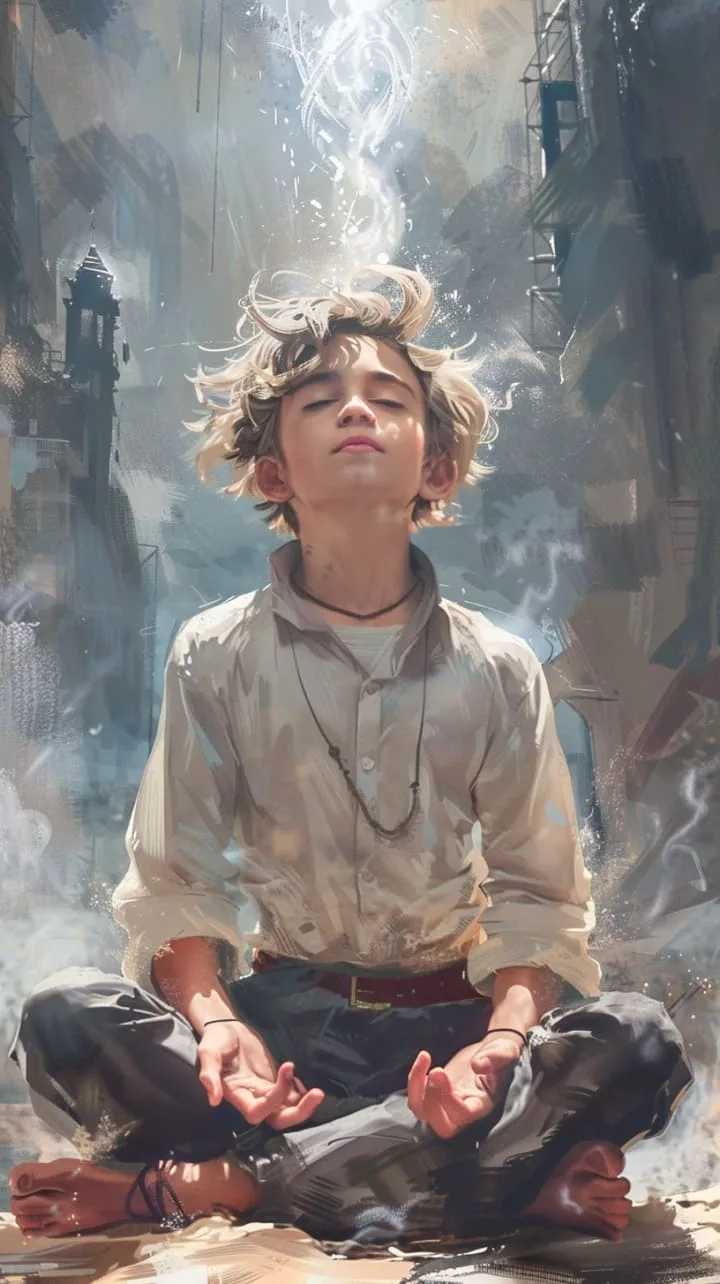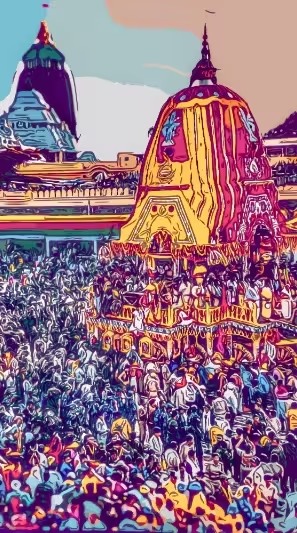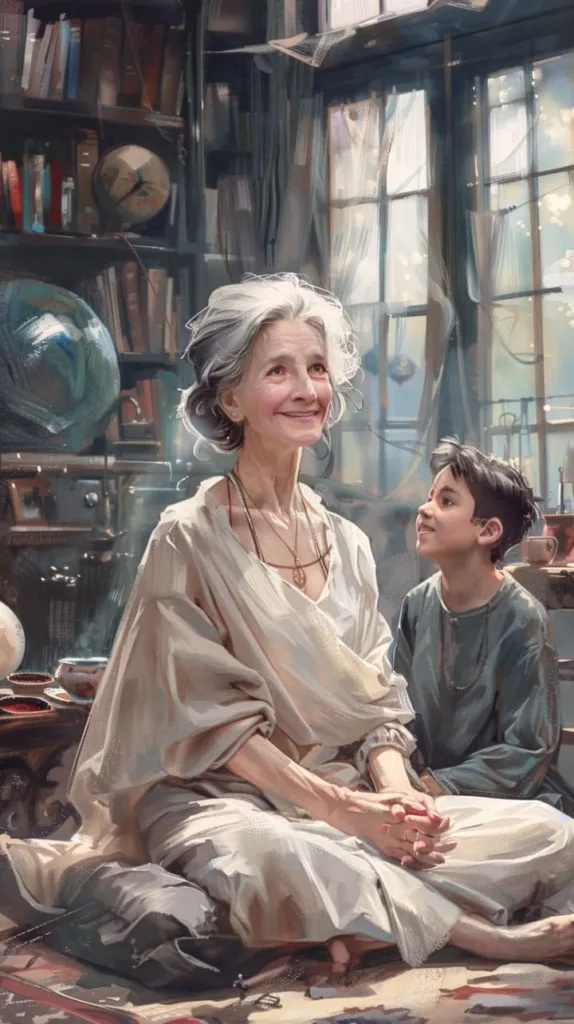
The Significance of Ekadashi Vrat
In the quaint town of Devbhoomi, nestled amidst the majestic Himalayas, 12-year-old Tarkik was blessed with a sharp mind and an insatiable thirst for knowledge. Tarkik lived with his loving parents and wise grandmother, whom he affectionately called Dadi.
One evening, as the silvery moon cast its gentle light upon the town, Tarkik noticed his Dadi busy preparing for a special occasion. Intrigued, he approached her and asked, “Dadi, what are you doing? Is there a celebration coming up?“
Dadi smiled warmly and replied, “My dear Tarkik, tomorrow is the sacred day of Ekadashi. It’s a time when we fast and pray to Bhagwan Vishnu, seeking his blessings and guidance.“
Tarkik’s eyes widened with curiosity. “Ekadashi? I’ve heard that name before, but I don’t know much about it. Can you tell me more, Dadi?“
Dadi patted the spot next to her, inviting Tarkik to sit closer. “Of course, my child. Let me tell you the story of how Ekadashi came to be.“
As Tarkik listened attentively, Dadi began the tale. “Long ago, in the celestial realm, a fierce battle raged between the Devtàs and a powerful demon king named Muru. Muru ruled a kingdom called Chandravati. He defeated the Devtàs, who were led by Indra, and took control of their kingdom, plunging the world into darkness.“
“The Devtàs, desperate for help, sought the guidance of Bhagwan Shiva, the destroyer of evil.”
As Tarkik listened intently, Dadi continued the story. “With great wisdom, Shiva advised them, ‘Come, let us all go together to Bhagwan Vishnu, who resides in the Kshirsagar, the Ocean of Milk. He alone can save us from this crisis. Whoever takes refuge in Him, He grants them protection.‘”
“‘Only by obtaining His assistance can we attain victory over Muru. There is no other solution to this problem.‘”
The Devtàs, with Shiva leading the way, proceeded to the shores of the Kshirsagar. Standing there, they all began to pray earnestly.
Pleased with their devotion, Bhagwan Vishnu appeared before them and asked, “’What difficulty has befallen you? Tell me about it.’“
Bhagwan Shiva narrated the story of Muru’s atrocities and the Devtàs’ plight to Bhagwan Vishnu, humbly seeking His assistance.
Bhagwan Vishnu replied, “Devtàs, arm yourselves with weapons and march towards Muru’s city. I will join you shortly.“
The Devtàs enthusiastically prepared their army and set out for the land of the demons. The vast army surrounded Muru’s capital, Chandravati, from all sides. Bhagwan Vishnu also arrived at the appointed time, wielding His Sudarshan Chakra.
The demons, too, came onto the battlefield with their weapons, and a fierce battle ensued. The demons were formidable, and the Devtàs could not withstand their might. Defeated, the Devtàs began to flee from the battlefield.
At that moment, Bhagwan Vishnu challenged the demon king Muru, and a fierce duel began between them. The battle continued for many years, with Bhagwan Vishnu and Muru each gaining victory at times. Neither side could decisively defeat the other.
“Exhausted from the ceaseless fight, Bhagwan Vishnu retreated to a secluded cave in the Himalayas to meditate and regain strength.“
“Seizing this opportunity, Muru pursued Bhagwan Vishnu, intent on striking him down while he was vulnerable. But just as Muru raised his sword, a brilliant light emanated from Bhagwan Vishnu’s ten senses and the mind, forming the radiant Goddess.“
“The Goddess, with her divine power, swiftly vanquished Muru, freeing the world from his tyranny.”
The commotion of the battle roused Bhagwan Vishnu from his slumber, and he looked upon the scene with astonishment. Turning to the divine goddess, he asked, “Who has slain this mighty demon, and who are you roaming in this secluded forest?“
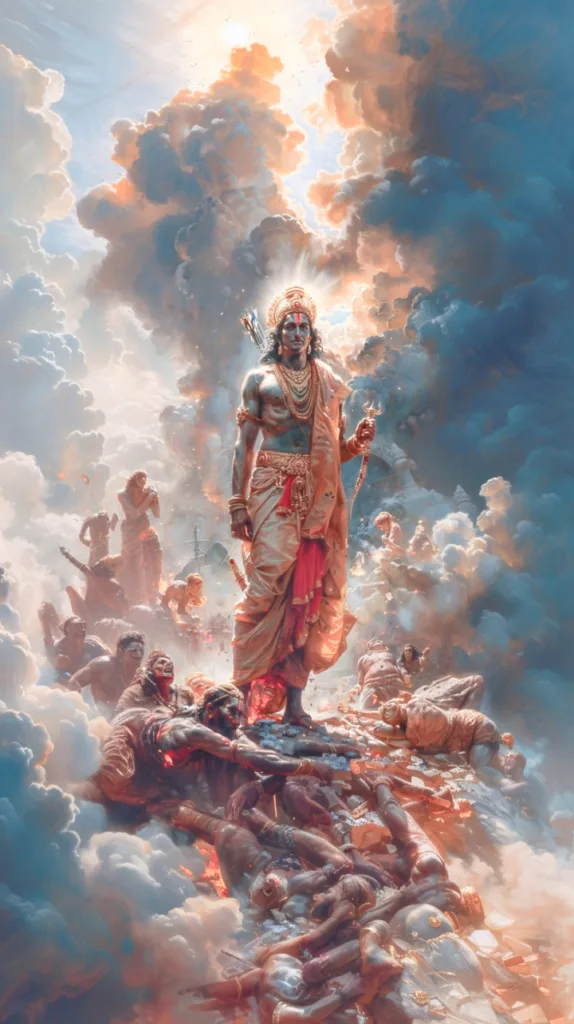
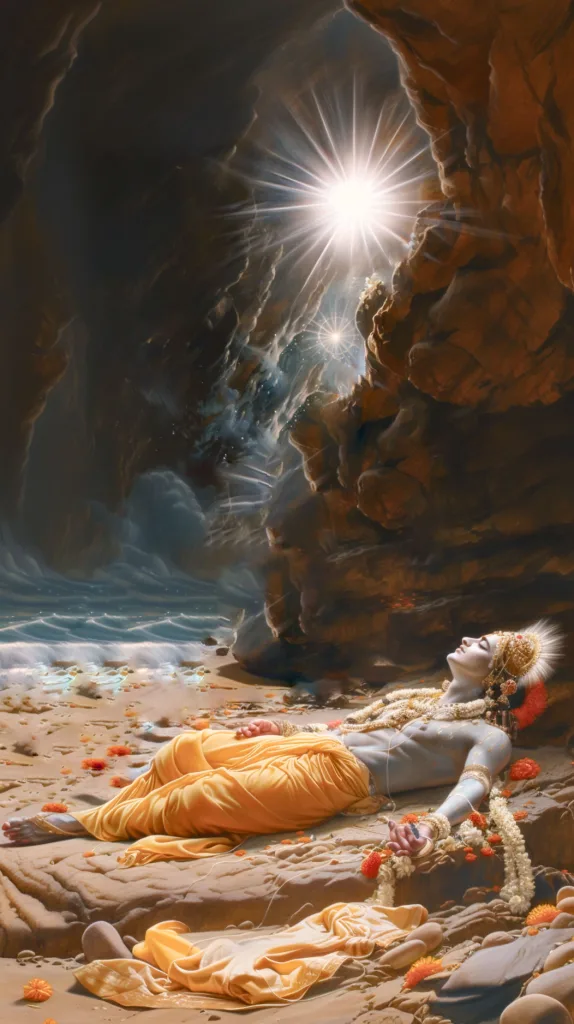
The goddess replied, “Prabhu, I am your own daughter.“
“To slay this demon, I was born from your own body. The divine energy residing in your ten senses (Indriyas) and the eleventh, the mind (Manas), gave me this form, and it is I who have vanquished this demon.“
Bhagwan Vishnu was overjoyed and said, “As you were born from the 10 senses and the eleventh, the mind, your name shall be Ekadashi. Ask of me any boon you desire, and I shall grant it.“
Goddess Ekadashi said, “Each month, there are two days known as Ekadashi. On these days, whosoever observes a fast, performs worship, and offers prayers to you shall attain a blessed state. May your grace always be upon them.“
“May such beings find happiness in this world and, after death, attain your divine presence in the next. This is all I wish for, and I have no other desire.“
“Bhagwan Vishnu granted the selfless boon sought by Ekadashi, which was born out of a desire for the welfare of others. From that moment on, the tradition of observing the Ekadashi Vrat (fast) began.”
“Bhagwan Krishna narrated this story to Yudhishthira and is famously known as the Krishna-Pandava dialogue in the Mahabharat,” Dadi said to Tarkik.
The Ten Senses
Tarkik listened intently to Dadi’s story, captivated by the dramatic events unfolding. As Dadi described how Goddess Ekadashi emerged from Bhagwan Vishnu’s ten senses and mind, Tarkik’s curiosity was piqued.
“Dadi,” Tarkik asked, “you mentioned Bhagwan Vishnu’s ten senses. I thought we only had five senses. Can you explain what you mean by ten senses?“
Dadi smiled, appreciating Tarkik’s keen observation. “Ah, my dear, that’s a wonderful question. In our tradition, we recognise ten senses, divided into two categories: the five Gyanendriyas, or senses of perception, and the five Karmendriyas, or senses of action.“
Tarkik leaned forward, eager to learn more. Dadi continued, “The five Gyanendriyas are the senses through which we perceive the world around us. They are the eyes for sight, the ears for hearing, the nose for smell, the tongue for taste, and the skin for touch.“
“And what about the Karmendriyas, Dadi?” Tarkik asked.
“The Karmendriyas are the five senses of action, which enable us to interact with the world. They include the hands for grasping, the feet for movement, the mouth for speech, the reproductive organ, and the excretory organ. These senses allow us to perform actions and engage with our surroundings.“
Tarkik nodded, absorbing this new knowledge. “So, Goddess Ekadashi emerged from all ten of these senses, and the eleventh is mind?“
“Yes, my child,” Dadi replied.
Tarkik listened to the story with rapt attention, his eyes sparkling with wonder. “Wow, Dadi! That’s an amazing story. But I feel like there’s more to it than just a battle between gods and demons.“
Dadi smiled, pleased with Tarkik’s perception. “You’re right, my dear. The story of Ekadashi holds a deeper meaning. It is a metaphor representing the battle that takes place within each one of us.“
Next: Dadi explains the deeper spiritual meaning of the tale
